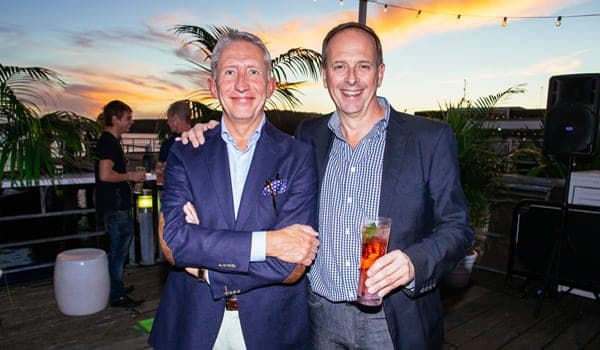Australians are renowned for enjoying a tipple.
For many, good times and relaxation are enhanced with a beverage in hand. While for many years that mental picture would have been a beer or a glass of wine – these days could very well be a cider.
Indeed, the local demand for cider has doubled over the past five years to become a $306 million a year industry*.
Entering the local market at perhaps just the right time, Swedish cider brand Rekorderlig is well-known and recognisable for its sleek branding. Yet far from being the brainchild of a faceless corporation, it all started at a kitchen table 19 years ago.
In Australia for partner meetings and the Taste of Sydney festival, Rekorderlig founder Anders Nanne, and CEO of production partner Åbro, Henrik Dunge, sat down with Dynamic Business and bashfully reflected on their tremendous success.
“It’s fantastic, but also a strange feeling to go down to Manly beach and see people drinking our product. I always say I’ve got three children – my son who is 22, my daughter who is 14, and Rekorderlig who is 19. You can’t imagine what it’s like to walk around Sydney, or London, or New York, and see people drinking it – it’s an amazing feeling,” Nanne says.
Starting out as little more than a concept for a premium cider brand, Nanne says that along with his wife and friend, the trio saw their opportunity to get started when Sweden joined the EU in 1995. With the green light to sell larger quantities of cider than before, as well to export, Nanne says this period also saw the disruption of the [domestic] monopoly of that time.
“So my wife, my friend, and I decided that we should strive for something more, and so we created the brand. In the beginning we looked at other brands in the market, and everyone was aiming for the sparkling wine look with a lot of silver and gold. We thought that in order to be trusted, we had to find a way to put ‘Sweden’ into the label. So we had a clean design, transparency, and a strange word for a brand, because ‘Rekorderlig’ means trustworthy,” Nanne says.
“We didn’t have a micro brewery or anything like that, we really didn’t have a clue – we just had the brand design: that it should be a premium brand, and we had three key words to follow – taste, taste and taste,” Nanne adds.
This philosophy peaked the interest of Henrik Dunge, who met Nanne in 1997. As the CEO of a 150-year-old brewery, Dunge was interested in diversifying into cider, and bought Rekorderlig from Nanne. “I had the brand, and he had the money,” Nanne laughs. “Now I joke that today I have no money and no brand, because I sold the brand to Henrik!”
“An important point in our common success though is that Henrik was really brave in deciding to work with us. He invested a lot of money in a brand that actually was nothing at that stage, but we both had this gut feeling that the brand has something, and it might be something very big in the future. We knew how we wanted it to taste, and how it should taste, and we said ‘we’re going to be the best – the very top quality’,” Nanne says.
Swedes have a long tradition of making sweet cider, and in looking at consumer preferences in the UK, where dry cider is generally more popular, the duo decided to trust their instinct and try their flavour abroad.
“[Initially] we were keen to explore other types like UK ciders and dry ciders, but for us – we were used to drinking sweet cider, and we thought ‘we love it, and maybe other people will love it too’. So when were allowed to start exporting, it was exciting for us,” Dunge says.
The mentality of trusting their gut instinct is central to the success of Rekorderlig. When seeking a marketing partner in the UK, Nanne and Dunge received several pitches from large firms, but it was the small firm with just three staff who they chose to work with.
“It’s also very important to get someone from the outside to share their perspective, because as Swedes we never would have put forth ‘Beautifully Swedish’ – and when we came back to Sweden and told everyone that was to be our slogan there were some cringes!” Dunge says.
Sold in Australia now for almost four years, Dunge believes that despite the boom in local producers, there’s always a market for premium international brands.
“Something we know is that there’s a market for Swedish products in Australia, with a lot of mutual interest on both sides. We’ve proven that we can add value to market,” Dunge adds.
There’s a humility prevalent in both Nanne and Dunge which is perhaps attributable to their refusal to part with their independence. Although Dunge says he has received countless offers from eager buyers over the years, Rekorderlig remains independently owned.
“We’ve been in the brewery business for 150 years, and in the 80s, 90s and today there have been a lot of expressions of interest to buy – but we want to keep our independence. The same is true of listing on the stock market, there are a lot of voices all wanting to have their say. But suddenly you’ve lost your ability to be independent,” Dunge says.
Nanne adds that while there’s been plenty of mistakes made over the years, one of the best aspects of the company is to still work with a family owned business. “Like that old saying you can’t be half pregnant, you can never learn passion – and so it’s an advantage to work with a truly passionate person.”
*IBIS World statistics, June 2013

